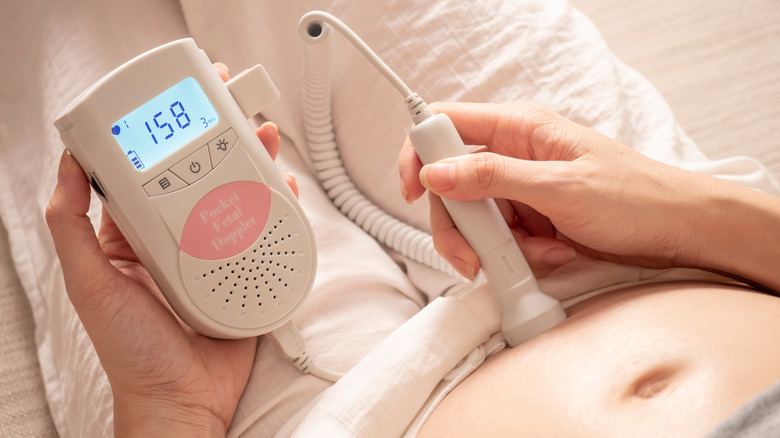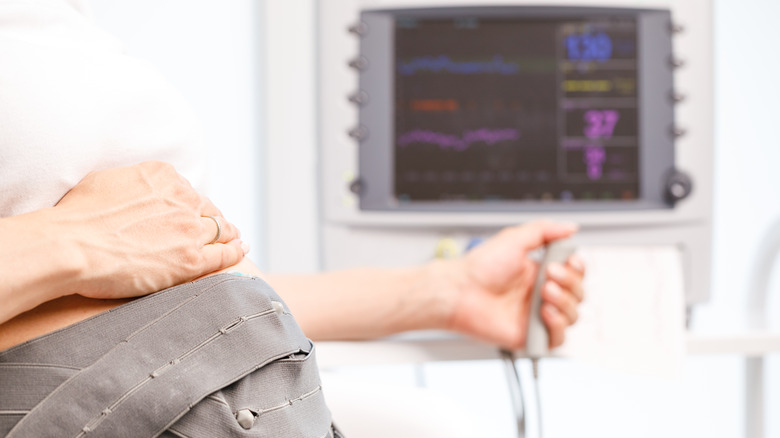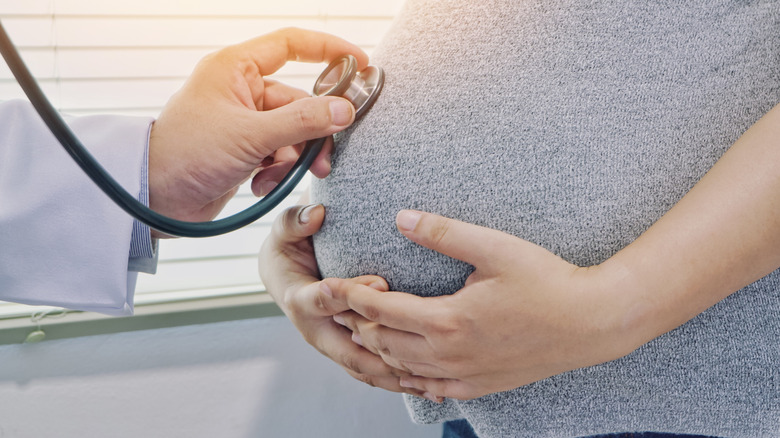How Safe Is It To Use An At-Home Fetal Doppler?
Expectant moms who are looking to keep tabs on their baby's growth and well-being may decide to use an at-home fetal Doppler. This is a device that allows parents to listen to their baby's heartbeat via the use of sound waves, similar to the ultrasound device that is used in an obstetrician's office. The Doppler sends sound waves through the skin and, when any movement is detected, the waves bounce back to the Doppler.
According to a 2011 study published in Human Reproduction, detecting an early heartbeat is linked to a lower likelihood of miscarriage. Given that, according to WebMD, some at-home fetal Dopplers have the ability to detect a baby's heartbeat as early as eight to 12 weeks, it's not surprising that many pregnant women are turning to these devices to give themselves some peace of mind. However, these devices are not always the guarantee that would-be mothers want them to be, and caution should be exercised when using them. In fact, in 2014, the Food and Drug Administration warned against using them entirely.
Quality is key when it comes to at-home fetal Dopplers
A 2009 report published in the BMJ speaks to the potential risks of relying on at-home fetal Doppler to determine the in-utero health of your baby. According to that report, a 31-year-old mother-to-be had noticed that her baby had not moved but used an at-home fetal Doppler to listen to the heartbeat over the weekend, assuring herself that the baby was fine. However, when she had an ultrasound with her doctor, it was confirmed that the fetus was no longer viable. Experts maintain that this serves as a tragic example of why an at-home unit does not supersede the technology and experience of your doctor.
In addition, Healthline reports that there is minimal quality control when it comes to store-bought Doppler devices, with multiple companies creating everything from physical devices to apps. Because of this, pregnant moms can't always be sure that they're getting a top-shelf product when they buy something at their local store.
Another concern stems from the heat that these devices generate, according to MedicalNewsToday. This heat could, over time, lead to potential abnormalities in the fetus. In worst-case scenarios, these abnormalities could lead to the pregnancy being lost.
Nothing beats seeing your doctor
One of the biggest deterrents to using at-home fetal Dopplers, according to the Royal College of Midwives, is the psychological toll it can take on expectant mothers. According to the RCM, women who use them may hear their own heartbeat instead of their baby's and be lulled into a mistaken sense of security. This could prevent them from seeing a doctor and catching an actual emergency before it's too late. Secondly, given that the average woman isn't trained on ultrasound equipment, they may not always know how to use it correctly and, even though their baby may be perfectly healthy, may not be able to detect a heartbeat. This could lead to unnecessary stress and panic as these women worry about the safety of their unborn children.
While there is no definitive evidence against using at-home fetal Dopplers, there are enough factors to cause expectant moms to consider alternative methods of gauging their baby's health (via MedicalNewsToday). These include doing kick counting starting in the second trimester, making regular appointments for in-office ultrasounds, and looking for signs that the pregnancy could be in trouble, such as spotting or fluid leaking. However, if you still feel like you would like to have something in the house to monitor your baby's heartbeat, consult with your doctor to ensure you're buying a top-quality model.



